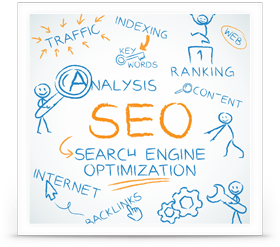
EMD – exact match domain. These are domains that exactly match the keyword phrase they are targeting, for example, the domain sheffield-electrician.co.uk is targeting the search engine term ‘Sheffield Electrician’
CTR – click through rate. This measurement is usually described and used to measure the interaction between the audience and the required action (the ‘click’). The click-through-rate is most commonly used when evaluating the effectiveness of a PPC campaign, for example, a sponsored Google PPC advert may receive 1000 impressions in a day but have only a 5% click-through-rate. The number of people who see the ‘link’ divided by the number of people who actually click on that link give you the click through rate.
CRO – Conversion Rate Optimisation. This practice refers to changes made to a website or advert to attempt to positively influence the site visitors behaviour in terms of the site goals e.g. to make an enquiry, or to sign up to a newsletter.
PPC – Pay Per Click. This refers to a type of advertising where the advertiser only pays an agreed amount when their link (usually on an advert) is clicked. Google ads are generally paid for on a PPC basis these days.
PPI – Pay Per Impression. This refers to a type of advertising where the advertiser pays an agreed amount based on their advert appearing a pre-agreed number of times, for example, Facebook adverts are often sold on a PPI basis, for example, you pay per 1000 impressions. This form advertising does not rely on interaction (for example, people clicking on the advert link), the advert merely has to appear on a page in front of someone.
SMM – Social Media Management. This refers to the activity of managing the social media activity by or on behalf of an individual or organisation
SMO – Social Media Optimisation. This refers to optimising the social media activity, usually in relation to supporting the main business activities.
SERP or SERPs – Search Engine Results Page(s). This refers to the results returned by the search engine according to your search query. For example, a search on Google for a word or phrase will return a SERP – i.e. a results page with links to websites relevant to the
SEO – Search Engine Optimisation. This is the practice of both making changes to a website to allow it to be indexed properly by the search engines according to its purpose and for increasing the traffic visiting a website.
SEM – Search Engine Marketing. The process of gaining traffic to your website and increasing online visibility
Have I missed anything from this list?
If I’ve missed anything from this list, let me know through the contact form or by email